Brexit: DUP in talks with ministers ahead of third vote
- Published
- comments
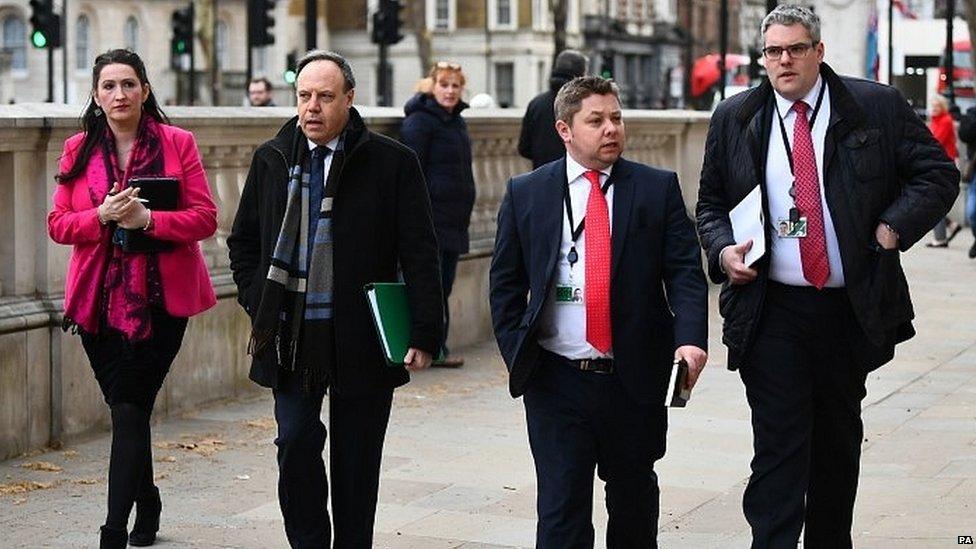
The DUP say Brexit talks have "enlarged and intensified" in the past week
Ministers have held talks with the Democratic Unionists to try to get them to back Theresa May's Brexit deal ahead of a third Commons vote on the package.
The DUP are seeking further legal assurances about the deal, which has been decisively rejected by MPs twice.
The PM has received a boost after Esther McVey, who quit the cabinet over Brexit policy last year, signalled she could vote for the deal next week.
She said the prospect of a long Brexit delay called for "different thinking".
MPs voted on Thursday to ask the EU to push the date of Brexit back from 29 March to 30 June if the Commons approves a deal by next Wednesday - allowing time for legislation to go through.
However, if a deal is not agreed by then, EU leaders are contemplating a much longer delay.
Brexit Secretary Steve Barclay voted against the extension, despite saying in the Commons that voting for it would be in the "national interest".
He told the BBC he would back a short extension to give time for legislation, but not a longer delay.
"If we don't have a deal, then we should leave with no deal," he said. "That's always been my position. We shouldn't be afraid to leave with no deal."
Barclay: "I'm proud we stopped attempt to frustrate Brexit"
The result prompted a number of Tory MPs to say they will back the deal in the next vote, due to take place by 20 March.
And the DUP, which has opposed the deal up to now, are seeking further "clarifications" on the government's legal advice about the backstop - the controversial arrangement to prevent physical checks on the border between Northern Ireland and the Republic of Ireland - and how the UK could exit it.
What happened this week?
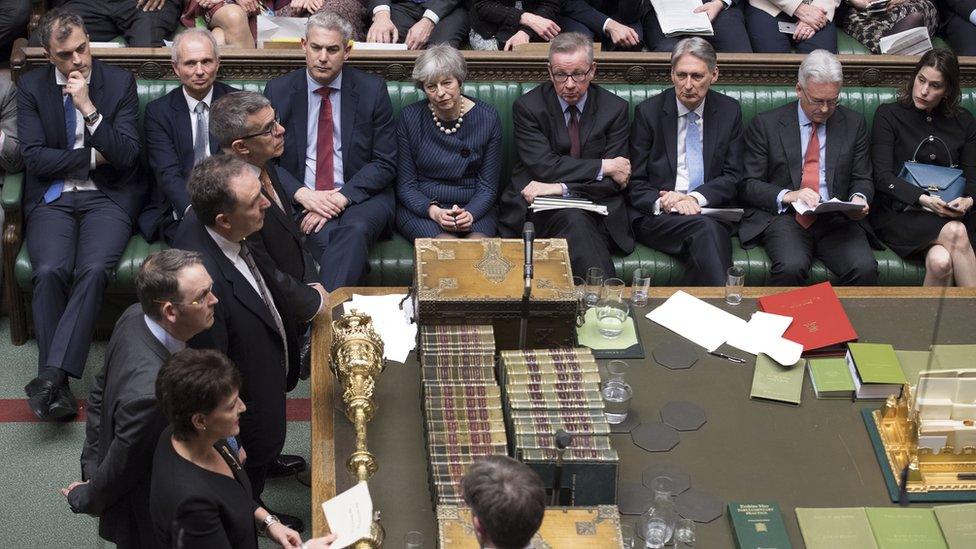
MPs took part in a series of votes in the Commons
A series of Brexit votes have taken place in the Commons:
On Tuesday, MPs rejected Mrs May's withdrawal agreement for a second time by 149 votes
On Wednesday, MPs voted to reject the idea of the UK leaving the EU without a deal under any circumstances
Then, on Thursday, the Commons voted by 413 to 202 to seek an extension to Article 50 - the legal mechanism by which the UK is due to leave the EU
However, as things stand, the law has not been changed, as Wednesday and Thursday's votes were not legally binding.
That means the UK is still set to leave on 29 March - with or without a deal.
What are the UK's options?
Political Correspondent Jonathan Blake explains what's next for Brexit
While legally, there does not have to be a delay, politically it might be hard for Mrs May to avoid.
Thursday's motion saw Parliament agree to two options for a delay:
If MPs support Mrs May's deal next week - before a summit of EU leaders in Brussels on 21 March - then she will ask the EU for an extension of no later than 30 June
But if they don't support her deal for a third time, there could be a much longer delay and the UK may have to take part in elections for the European Parliament in May
Any delay will require the agreement of all other 27 EU members and talks about possible conditions could take place before the summit.
European Council President Donald Tusk said EU leaders could be open to a long extension "if the UK finds it necessary to rethink its Brexit strategy".
What has the government said?
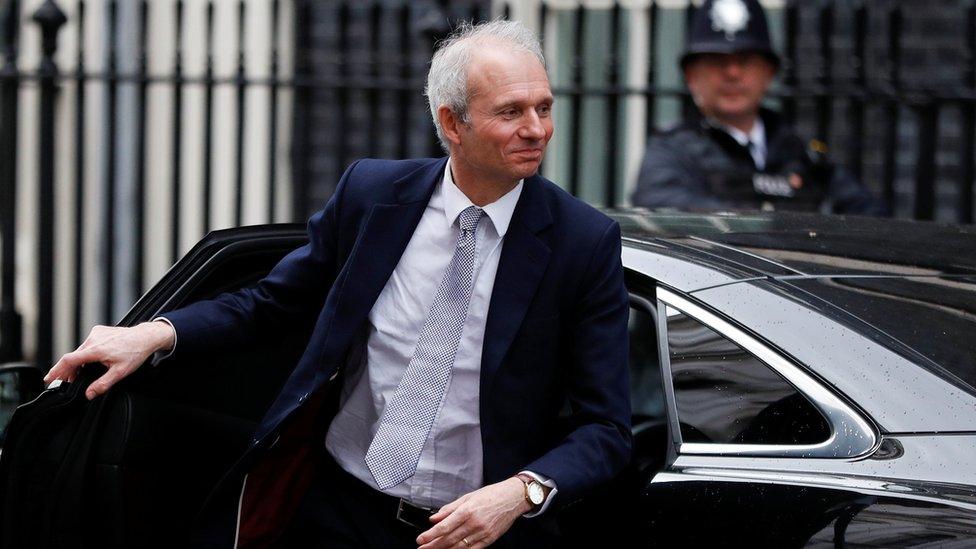
David Lidington calls on MPs to "reflect" on the deal over the weekend
Cabinet Office minister David Lidington, who is regarded as Mrs May's de facto deputy, told the BBC that, although the risk of the UK leaving without a deal had "diminished" as a result of this week's votes, it could still happen unless an alternative solution was found.
He urged MPs to "reflect" over the weekend on the deal on the table, which he said had the "great virtue" of having the backing of all 27 other EU governments and, most likely, the European Parliament too.
"I think there is some real impatience among the British public, and frankly among other EU governments, with this inability to agree in Westminster on the way forward," he told BBC Radio 4's Today programme.
"The alternative, spelt out very clearly and accepted by the House of Commons, is that you don't just have a short technical extension to our membership. You almost certainly need a significantly longer one."

Will EU leaders agree to an extension?

EU politicians breathe deep, shuddering sighs at the thought of prolonging the cross-Channel agony of the Brexit process.
So will they or won't they agree to an extension? What conditions could they demand and how long would Brexit be delayed by?
Like so many things to do with Brexit - the answer is: we're not 100% certain.
Earlier this week, a number of EU leaders including France's Emmanuel Macron, Mark Rutte of the Netherlands and Spain's Pedro Sanchez sounded pretty hard-line.
They wouldn't agree to delay Brexit, they said, unless the prime minister came up with a very good reason.
EU leaders are frustrated, irritated and fatigued by the Brexit process but it's also worth bearing in mind that they have two specific audiences in mind these days when they take to the cameras.

Will MPs change their minds about the deal?
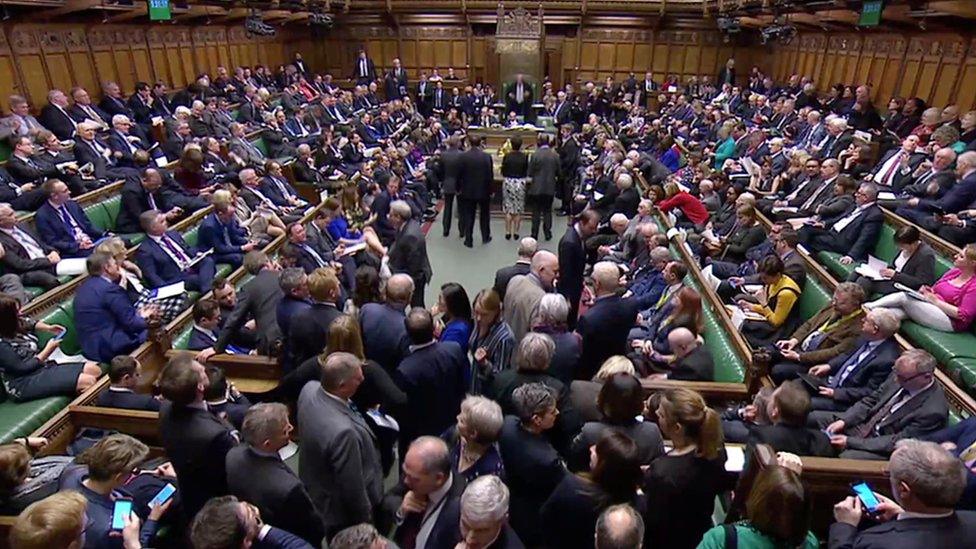
There are a range of views across the Commons on Brexit
This remains unclear.
Mrs May brought back additions to her deal after late night talks in Strasbourg on Monday to try and allay fears about the Irish backstop - the insurance policy to stop a hard border returning to the island of Ireland - as this had been the main sticking point when her deal was voted down the first time.
Tuesday's vote showed that some critics had been won over, but while the PM was not defeated by such an historic margin as she was in January - 230 votes - she still lost by a significant margin.
Now it is a case of persuading Brexiteer backbenchers in the European Research Group and the Democratic Unionist Party, as well as trying to win over members of the opposition.
Some MPs have suggested looking into whether the backstop could be solved by using Article 62 of the Vienna Convention - which would allow the UK to withdraw from any treaty if there had been "a fundamental change of circumstances... which was not foreseen by the parties".
In a letter to the Times, cross-bench peer and QC Lord Pannick said the UK would be "entitled to terminate the withdrawal agreement" under this clause - although he questioned whether it would be "wise politically".
Leader of the Commons Andrea Leadsom said the government's Attorney General, Geoffrey Cox, had considered the matter and would comment further if he thought it was necessary.
Where do the parties stand?
Jeremy Corbyn: Public vote an "option to break deadlock"
The past week's votes have exposed divisions in the main parties.
More than half of Tory MPs - including seven cabinet ministers - voted against Mrs May's motion to put back the date when Britain leaves the EU.
Downing Street said this was a "natural consequence" of Mrs May's decision to offer a free vote on an issue where there are "strong views on all sides of the debate".
And in the Labour Party, 41 MPs rebelled against party orders on Thursday to abstain in a vote on a possible new referendum - with 24 supporting a referendum and 17 voting to oppose one.
Five of those MPs have resigned from their roles in the party as a result.
Shadow trade secretary Barry Gardiner said Thursday's vote was about securing an extension to negotiations and was not the right time to vote for another referendum.
"If it's the only way we can stop a no deal or a bad deal, then that is when it comes into play," he told BBC Radio 4's Today programme.
Gina Miller, who took the government to court to force them to consult Parliament on the Brexit process, also told the programme she did not believe Thursday was the right time to push for another referendum - but insisted the option was not off the table, despite being heavily defeated by MPs.
"You have to try and exhaust all the other options first and if parliament can't resolve it, it's at that point that it goes back to the people," she said.
- Published14 March 2019
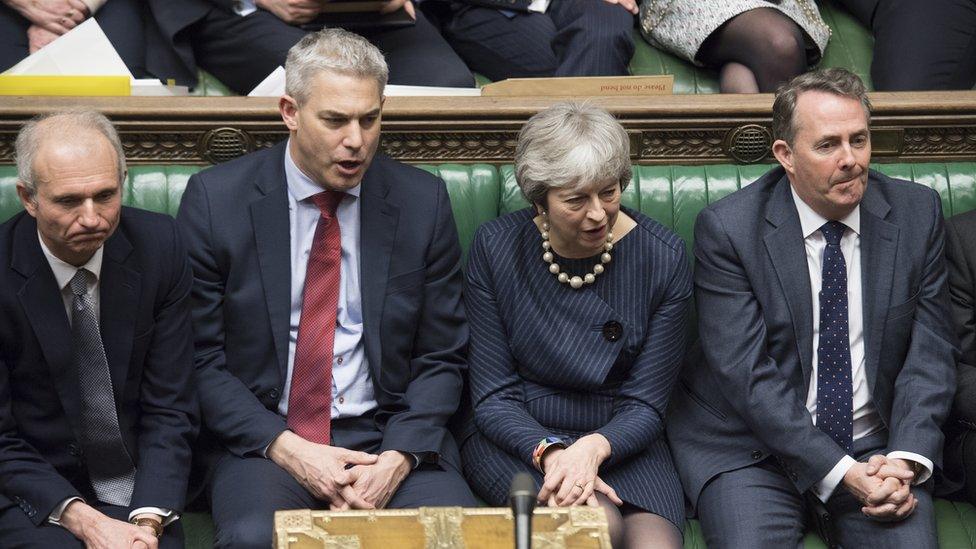
- Published14 March 2019

- Published15 March 2019
- Published13 July 2020
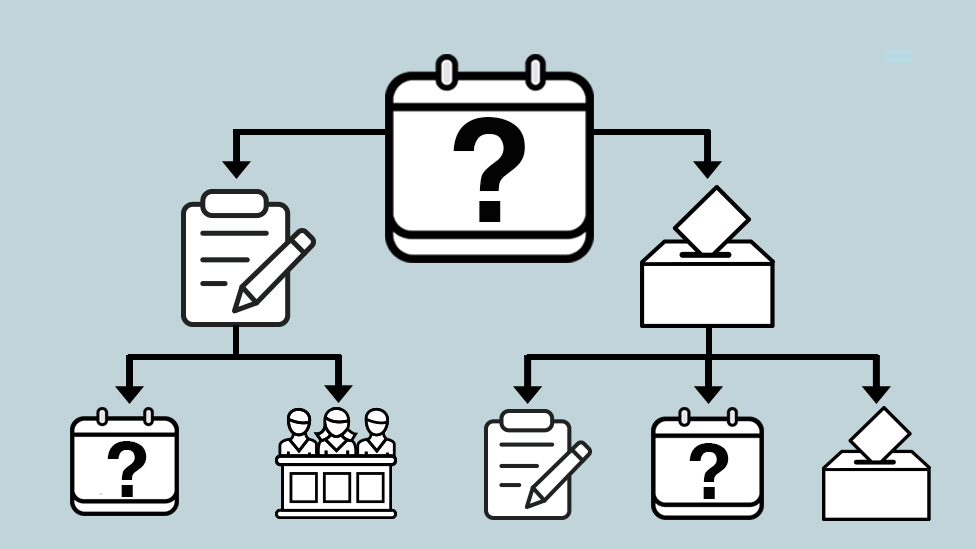
- Published14 March 2019
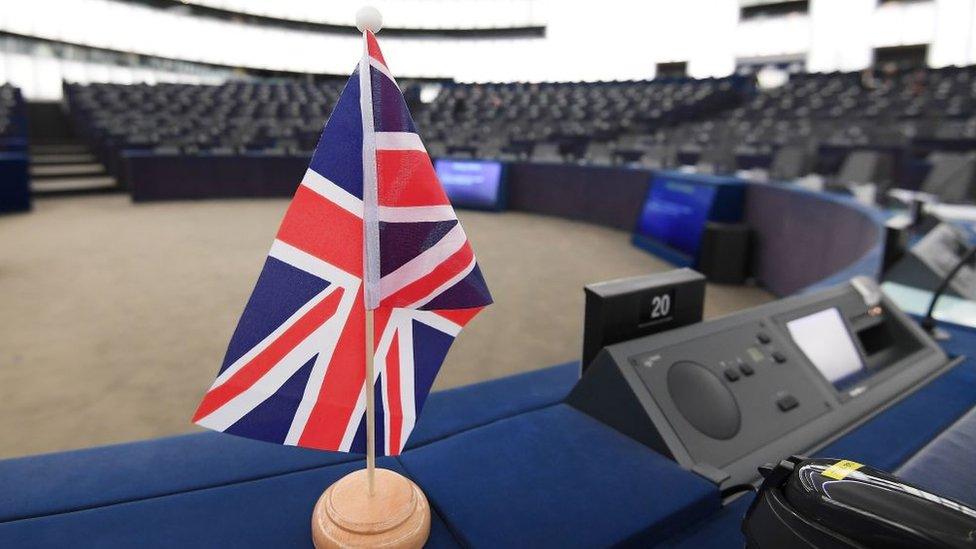
- Published30 July 2019
